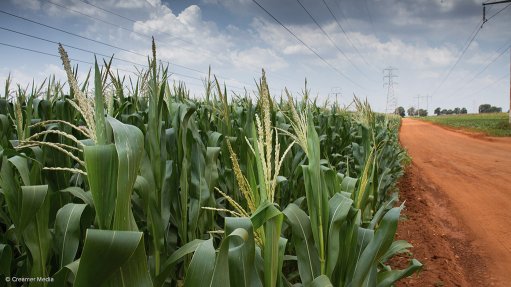
Photo by: Duane Daws
A perfect storm of subdued local economic growth prospects, financially constrained consumers, as well as weather, policy and labour uncertainty is likely to continue to challenge farmers and agribusinesses into the new year, the Agbiz Outlook 2015 has cautioned.
“In a deteriorating economic, social and political environment, as reflected by recent downgradings by investment rating agencies, South Africa has reached a dangerous and critical crossroad.
“Exacerbating this imperfect situation is a major and prolonged countrywide and regional drought, impacting negatively on both the agricultural and agribusiness environments. This is putting South Africa’s open, competitive agrofood system and its food security at considerable risk,” Agbiz CEO Dr John Purchase said in a statement on Wednesday.
An additional threat to the stability of the domestic agriculture sector was impending land reform legislation in the form of the yet-to-be-finalised Expropriation Bill, as well as the looming introduction of the Regulation of Land Holdings Bill, which proposed land ceilings and the prohibition of agricultural land ownership by foreigners.
Other critical pieces of legislation that would feature in the legislative process and affect the agribusiness environment included the Carbon Tax Bill; the National Skills Development and Sector Education and Training Authorities (Seta) landscape; the Border Management Agency Bill; the Liquor Amendment Bill; new legislation governing the water environment and giving effect to the second version of the Cabinet-adopted National Water Resource Strategy; and the implementation of the Agri Black-Economic-Empowerment Sector Code, once finalised.
“Additional and critical policy and legislation impacting on the agrofood industry will no doubt surface in 2016 and will be addressed by Agbiz,” said Purchase.
Reflecting on business confidence and industry growth, Agbiz agribusiness intelligence manager Lindie Stroebel said confidence levels in the agribusiness sector, as measured through the Agbiz/Industrial Development Corporation Agribusiness Confidence Index, had been dropping consistently for over a year.
“Since the second quarter of the year, more agribusinesses indicated negative confidence about the state of their situation. Future prospects indicate the possibility that confidence may be more positive early in 2016, but, since the agricultural conditions are not improving, this is highly unlikely to realise,” she remarked.
Meanwhile, Agbiz International Trade and Investment Intelligence head Tinashe Kapuya said the past two years had seen the global and regional trading system becoming increasingly complex, introducing possible export headwinds for local producers.
“At a global level, the impasse in the World Trade Organisation’s Doha Development Agenda continued unabated, with the Trade Facilitation Agreement being widely viewed as a package that ‘saved’ the protracted negotiations from collapsing.
“At regional level, much focus has been on deepening integration through a Tripartite Free Trade Agreement that consolidates half of Africa into a single market. The aforementioned global and regional phenomena are going to be significant in shaping South Africa’s future trade growth,” he asserted.
While there was much reason for optimism, Kapuya outlined that emerging concerns had arisen from South Africa’s future trade relations with the US under the Africa Growth and Opportunity Act (Agoa).
“The tenuous nature of the new Agoa iteration points towards a renewed sense of trade and business insecurity that will likely compel South Africa to seriously consider negotiations for a reciprocal trade arrangement with the US,” he cautioned.
Meanwhile, the Southern African Customs Union (Sacu) was currently concluding the Economic Partnership Agreement (EPA) negotiations with the European Union (EU).
The EPA, which was expected to be concluded in 2016, represented a new era in South Africa’s trade relations with the EU and provided a more flexible arrangement that also offered increased agricultural market access compared with the Trade and Development Cooperation Agreement.
“Elsewhere, the Sacu–Mercosur agreement will expectedly be implemented in the near future after years of negotiation, while the Sacu–India Preferential Trade Agreement is still under negotiation, with little indication of it being concluded in the near term,” said Kapuya.
In light of the impending challenges thrown into focus by the recent report, Purchase appealed to government to “take a hard and critical look” at the specific structural problems besetting the economy and implement corrective measures.
“While the additional austerity measures announced by Finance Minister Nhlanhla Nene in the recent Medium-Term Budget Policy Statement are a step in the right direction in curbing excessive government expenditure, considerably more needs to be done by government to instil investment confidence in especially the primary productive capacity of the private sector.
“To say the least, 2016 will be extremely challenging and interesting, but the expected crises of 2016 will also provide the opportunity to the country, and government especially, to redirect its economic policy and steer the country in the right direction,” he held.